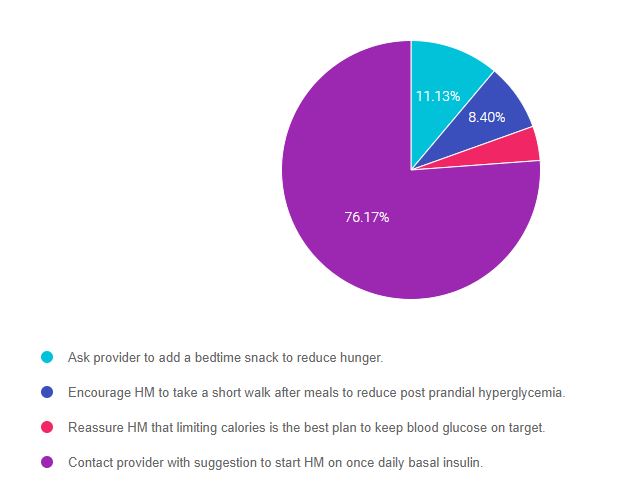
Our October 12th Question of the week quizzed test takers on the best strategy for a 90-year-old who states “they feel hungry” all the time. 76% of respondents, chose the best answer. We are excited to share this rationale of the week, so you can advocate for people living with diabetes.
Before we start though, if you don’t want any spoilers and haven’t tried the question yet, you can answer below: Answer Question
Question: HM is living with type 2 diabetes and is 90 years old with a BMI of 32. HM’s most recent A1c was 9.6% and their GFR is 16. The provider stopped the metformin due to the diminished kidney function and HM is currently on no diabetes medications. To manage HM’s blood sugar, the provider ordered a low-calorie restrictive meal plan for HM. HM was a chef for 40 years and tells you, “they feel hungry” all the time. Based on this assessment, you decide to contact the provider.
Which of the following would be the best suggestion?
Answer Choices:
- Ask provider to add a bedtime snack to reduce hunger.
- Encourage HM to take a short walk after meals to reduce post prandial hyperglycemia.
- Reassure HM that limiting calories is the best plan to keep blood glucose on target.
- Contact provider with suggestion to start HM on once daily basal insulin.

As shown above, the most common choice was option 4, the second most common answer was option 1, then option 2, and finally option 3.
Getting to the Best Answer
If you are thinking about taking the certification exam, it is helpful to know the goals of care and considerations for people with diabetes across the lifespan. This practice test question will set you up for success. Test writers anticipate possible answers based on the details in the question. They will wave those “juicy answers” that seem so familiar to you, right under your nose. Your job is to weed through the to choose the BEST answer.
Answer 1 is incorrect. 11.13% chose this answer, “Ask provider to add a bedtime snack to reduce hunger.” While it is true that HM is hungry, a bedtime snack is not the best solution since it might contribute to already elevated blood sugars. We need to figure out a way to get blood glucose levels to goal while providing adequate nutrition.
Answer 2 is incorrect. 8.40% of you chose this answer, “Encourage HM to take a short walk after meals to reduce post prandial hyperglycemia.” Post meal walks are an excellent way to decrease post meal blood sugars, but they most likely won’t be enough to get HM out of glucose toxicity. Given that HM’s A1c is 9.6%, the average blood sugars are around 230 mg/dl. HM will need more than post meal jaunts to get blood glucose to target.
Answer 3 is incorrect. 4.30% of respondents chose this answer, “Reassure HM that limiting calories is the best plan to keep blood glucose on target.” In this situation, we need to consider quality of life issues. Given that HM is 90 years old and they were a chef, limiting calories to the point of hunger is not a strategy that considers HM’s needs, values and wants. A better approach would be to create a person-centered solution.
Finally, Answer 4 is correct. 76.17% chose this answer, “Contact provider with suggestion to start HM on once daily basal insulin.” YES, GREAT JOB. In this situation we requested that the provider start HM on 10 units of 70/30 insulin in the morning. This simple intervention will help HM in numerous ways:
- allows more food flexibility
- renal protection due to lower glucose levels
- decreased nerve pain
- increase HM’s energy
- improve HM’s quality of life.
We hope you appreciate this week’s rationale! Thank you so much for taking the time to answer our Question of the Week and participate in this fun learning activity!
Want to learn about this question and more as you’re studying for the CDCES Exam?
Enroll in our CDCES Online Prep Bundle + 5th Ed ADCES Review Guide Book | 43 CEs
This bundle includes our CDCES Online Prep Bundle (featured above) plus the ADCES Review Guide – 5th Edition-Revised. The online bundle includes Level 1, Level 2, and Level 3 (Boot Camp), plus two bonus courses. The ADCES Review Guide offers over 480+ practice questions and is a fantastic independent study tool and comprehensive resource for the Diabetes Care and Education Specialist Exam.
Sign up for Diabetes Blog Bytes – we post one daily Blog Byte from Monday to Friday. And of course, Tuesday is our Question of the Week. It’s Informative and FREE! Sign up below!
[yikes-mailchimp form=”1″]Accreditation: Diabetes Education Services is an approved provider by the California Board of Registered Nursing, Provider 12640, and Commission on Dietetic Registration (CDR), Provider DI002. Since these programs are approved by the CDR it satisfies the CE requirements for the CDCES regardless of your profession.*
The use of DES products does not guarantee the successful passage of the CDCES exam. CBDCE does not endorse any preparatory or review materials for the CDCES exam, except for those published by CBDCE.









